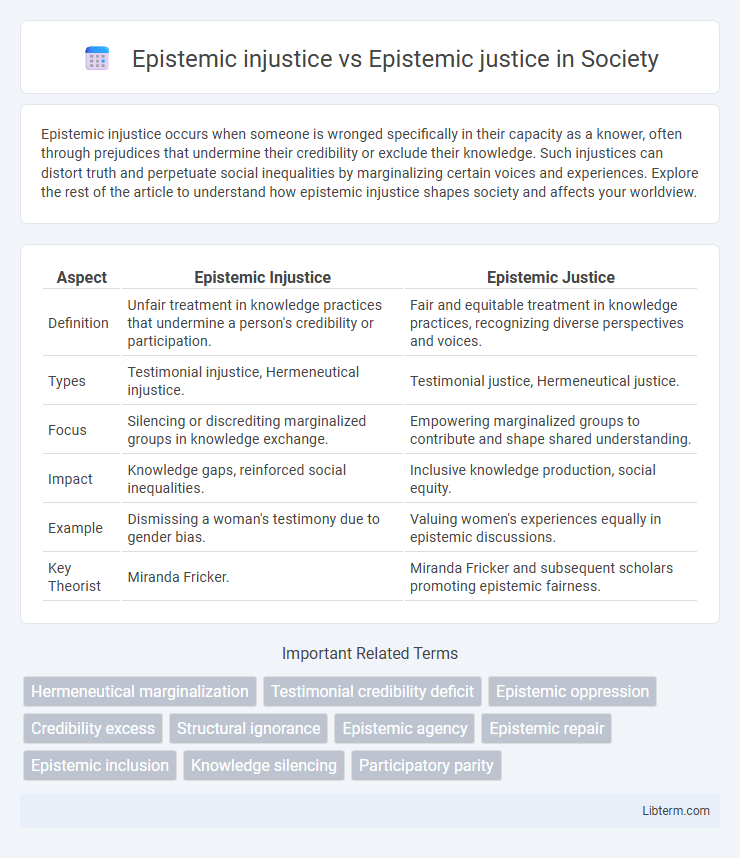Epistemic injustice occurs when someone is wronged specifically in their capacity as a knower, often through prejudices that undermine their credibility or exclude their knowledge. Such injustices can distort truth and perpetuate social inequalities by marginalizing certain voices and experiences. Explore the rest of the article to understand how epistemic injustice shapes society and affects your worldview.
Table of Comparison
| Aspect | Epistemic Injustice | Epistemic Justice |
|---|---|---|
| Definition | Unfair treatment in knowledge practices that undermine a person's credibility or participation. | Fair and equitable treatment in knowledge practices, recognizing diverse perspectives and voices. |
| Types | Testimonial injustice, Hermeneutical injustice. | Testimonial justice, Hermeneutical justice. |
| Focus | Silencing or discrediting marginalized groups in knowledge exchange. | Empowering marginalized groups to contribute and shape shared understanding. |
| Impact | Knowledge gaps, reinforced social inequalities. | Inclusive knowledge production, social equity. |
| Example | Dismissing a woman's testimony due to gender bias. | Valuing women's experiences equally in epistemic discussions. |
| Key Theorist | Miranda Fricker. | Miranda Fricker and subsequent scholars promoting epistemic fairness. |
Introduction to Epistemic Injustice and Justice
Epistemic injustice occurs when individuals or groups are unfairly discredited or marginalized in their capacity as knowers, often due to prejudice or social power imbalances. Epistemic justice seeks to rectify these wrongs by ensuring equitable recognition, participation, and authority in knowledge practices. Concepts such as testimonial injustice and hermeneutical injustice highlight how epistemic harm undermines both individual dignity and collective understanding.
Defining Epistemic Injustice: Key Concepts
Epistemic injustice occurs when individuals are wronged specifically in their capacity as knowers, often through testimonial injustice, where their credibility is unfairly deflated, or hermeneutical injustice, involving gaps in collective interpretive resources. Epistemic justice seeks to rectify these harms by promoting fair recognition of diverse knowledge sources and ensuring equitable participation in knowledge production. Concepts like power dynamics, social identity, and structural inequalities are central to understanding how epistemic injustice manifests and can be addressed.
Types of Epistemic Injustice: Testimonial and Hermeneutical
Epistemic injustice occurs when individuals are wronged specifically in their capacity as knowers, encompassing two primary types: testimonial and hermeneutical injustice. Testimonial injustice arises when a speaker's credibility is unjustly deflated due to prejudice, while hermeneutical injustice involves a gap in collective interpretive resources that disproportionately disadvantages certain groups from making sense of their social experiences. Epistemic justice seeks to correct these inequalities by ensuring fair credibility assessments and expanding interpretive frameworks to include marginalized perspectives.
The Roots and Causes of Epistemic Injustice
Epistemic injustice originates from social power imbalances that marginalize certain groups' knowledge and experiences, often rooted in systemic prejudice such as sexism, racism, and colonialism. These injustices manifest through testimonial injustice, where individuals' credibility is unfairly deflated, and hermeneutical injustice, where marginalized groups lack the interpretive tools to make sense of their experiences. Epistemic justice aims to correct these disparities by fostering inclusive epistemic practices that recognize diverse voices and equitable knowledge-sharing processes.
Epistemic Justice: Concept and Significance
Epistemic justice refers to the fair treatment of individuals as knowers, ensuring their knowledge and experiences are recognized and valued without prejudice. It addresses power imbalances in knowledge production and dissemination, promoting inclusivity and diversity in epistemic practices. Recognizing epistemic justice is crucial for combating discrimination, fostering social equity, and enhancing collective understanding through the validation of marginalized voices.
Mechanisms for Achieving Epistemic Justice
Mechanisms for achieving epistemic justice involve recognizing and mitigating epistemic injustices such as testimonial injustice, where individuals' credibility is unfairly deflated due to prejudice, and hermeneutical injustice, where marginalized groups lack the resources to make sense of their social experiences. Strategies include fostering inclusive epistemic environments that amplify marginalized voices, implementing epistemic humility among knowledge producers, and promoting collaborative knowledge practices that validate diverse perspectives. Institutional reforms and education aimed at acknowledging epistemic biases further contribute to rectifying systemic distortions in knowledge production and dissemination.
Social Power Dynamics in Epistemic (In)Justice
Epistemic injustice occurs when social power dynamics marginalize certain groups' knowledge and experiences, leading to testimonial injustice where their credibility is unfairly deflated. Epistemic justice seeks to redress these imbalances by recognizing and valuing diverse epistemic contributions, promoting inclusivity in knowledge production. The interplay of power structures profoundly shapes whose knowledge is legitimized or dismissed, affecting social equity and access to epistemic resources.
Real-world Examples of Epistemic Injustice
Epistemic injustice occurs when individuals or groups are unfairly discredited or marginalized as knowledge sources, often seen in instances such as racial minorities being dismissed in medical contexts or women's testimonies in legal settings being undervalued. Real-world examples include indigenous communities whose environmental knowledge is ignored by policymakers and patients whose pain is underestimated by healthcare professionals due to bias. Epistemic justice seeks to correct these disparities by recognizing and validating diverse knowledge systems and ensuring equitable participation in knowledge production and dissemination.
Strategies for Promoting Epistemic Justice
Promoting epistemic justice involves implementing strategies such as inclusive knowledge practices that recognize and validate marginalized voices, enhancing testimonial justice by addressing credibility deficits rooted in systemic biases. Structural reforms in education and institutional policies aim to dismantle epistemic exclusion, fostering environments where diverse epistemic agents can contribute equally. Empowering epistemic agents through critical pedagogy and collaborative knowledge production further counters epistemic injustice by challenging dominant knowledge hierarchies.
Conclusion: Towards an Epistemically Just Society
Epistemic justice promotes the fair treatment of knowledge contributors, ensuring marginalized voices are respected and credibility deficits are addressed. Epistemic injustice, including testimonial and hermeneutical injustice, perpetuates systematic marginalization by dismissing or undervaluing certain perspectives. Achieving an epistemically just society requires structural reforms that amplify diverse epistemic agents, foster inclusive dialogue, and dismantle prejudicial barriers to knowledge recognition.
Epistemic injustice Infographic

 libterm.com
libterm.com